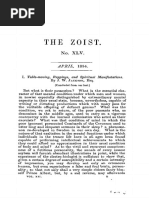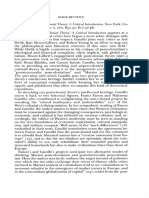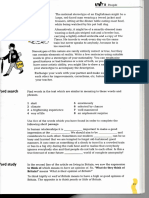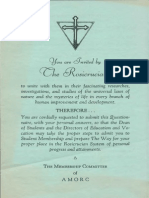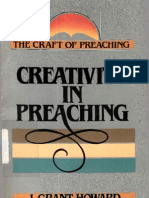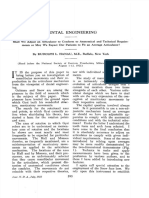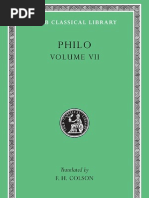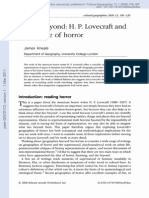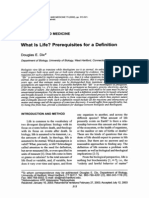Has God A Meaning?
Has God A Meaning?
Uploaded by
AlessandroSalisCopyright:
Available Formats
Has God A Meaning?
Has God A Meaning?
Uploaded by
AlessandroSalisOriginal Description:
Original Title
Copyright
Available Formats
Share this document
Did you find this document useful?
Is this content inappropriate?
Copyright:
Available Formats
Has God A Meaning?
Has God A Meaning?
Uploaded by
AlessandroSalisCopyright:
Available Formats
1968 1 71
Has 'God' a Meaning?
People are often tempted to thlnk of questions about meaning as though
they were ali on the levei of the most trivial disagreements about the use
of a particular word, the sort of disagreements that are rightly calied
'merely verbal': exemplified, for instance, in the fact that Americans use
the word 'suspenders' to refer to what we cali 'braces'. Obviously, no
sane person wouid waste rime arguing about which was the right word
to use, or what the word 'suspenders' really meant. But most questions
about meaning are not nearly as superficial as this, and in issues of metaphysics or religion we cannot proceed in this way.
Philosophers have become extremely conscious of the fact that it is
possible to use language in an impressive and profound-seeming way,
without what one says having any meaning at ali, or at least and this
is an important pointwithout its having the sort of meaning that the
speaker wouId like it to have.
Some speaker may think that he is making an important statement
about the nature of the universe, or of history, or something, and it may
turn cut, when he is pressed, that no meaning has been given to his sayings which is determinate enough for him to be making any recognizable claim at ali. In particular, this will be so if there is nothing definite
to distinguish what is involved in this man's claim from what wouId be
involved in denying that claim. There has to be a difference between what
things are like if it is true and what things are like if it isn't. If there is really no difference between what things are like if a certain claim is true,
and what they are like if it is not true, we can say that that claim has no
content at ali.
One very simple example, from the field of religious belief: and I
shouid say at once that I don't think that to criticize the sort of view I
am going to mention is, in itself, to criticize any serious form of religious
belief, since few serious religious believers.wouId believe anything as
simple as this. But there have been people who have thought that God's
purposes were positively manifested in naturai disasters such as eruptions and earthquakes; for instance, by the punishment of wicked persons
overwhelmed by these catastrophes. It is pointed out that the same catastrophes tend rather indiscriminately to involve also innocent persons,
such as small children; or presumably virtuous persons, such as members
of religious orders. The simple believer then replies that this manifests
God's purpose in another way, since it is good that the innocent and virtuous shouid go to Heaven.
He is then asked, presumably, why other innocent and virtuous persons are not given this benefit to go to Heaven quickly, but left to suffer
on earth to a hearty old age; and many of the wicked, indeed, seem to do
quite well and are not despatched. Something is then said to the effect
that it is also good that the virtuous shouid have life on earth, and that the
punishment of the wicked be delayed for a while, and so on. And after
ali this we see that absolutely anything that happened to the virtuous,
the wicked, or the in-between will count equally well; naturai calamities
directed by God turn out to be utterly indistinguishable in principle from
naturai calamities not directed by anyone; and the content of the claim
that the happening of such incidents reveals any sort of Divine purpose
dissolves in thin air.
As I said before, I don't think the very naVve view l've just mentioned
would be held by serious religious believers; in fact, I believe it wouId
be condemned by them, as superstitious. The fact that this superstitlous
view turned out to be vacuous and have no content would be held by
many sceptical philosophers to be the case, in a more sophisticated way,
as regards the centrai tenets of a religion such as Christianity. One form
of this more general sort of philosophical criticism was advanced by the
'logicai positivists'.
Logicai positivism started in the early years of this century, and was
developed principally in Vienna in the 'twenties. It became known in
this country through a very remarkable hook by Professor A. J. Ayer,
calied Language, Truth, and Logic, which was published in 1936. The
positivists held that there were only two sorts of statements that genuinely have meaning. One sort were statements which were true merely
because of the definitions of the terms used in them: a boring example is
'ali bachelors are unmarried'. These need not bother us. The other sort of
meanlngful statement consisted of those that could be shown to be true
or shown to be false by some possible sense-experience: for instance, by
some possible scientific experiment or obser\'ation. A l i other remarks not
of these two types were considered by the positivists to be meaningless.
This doctrine obviously dealt pretty hard with statements of religion,
which certainly d.bn't seem to be typically verifiable by science.
Many philosophers now would agree that a principal criticism of logicai positivism was the very narrow view it took of something's being
meaningful. It is obviously wrong just to lump together as meaningless everything that fails the positivist test; pieces of poetry, commands,
expressions of wishes, and lots of other pieces of ordlnary meaningful
1968
I Essays and Reviews
72
l a n g u a g e f a l l t h e test anci y e t h a v c m c a n i n g . T h e p o s l t i v i s t c h a l l e n g e
has
helped to make philosophers m o r e conscioiis of d i f f c r e n t sorts of inean-
s t a t e m e n t s o f h i s r e l i g i o n are n o t m e a n i n g l e s s :
I 73
t h e y have just this m e a n -
i n g , t h a t the s p e a k e r d e c l a r e s s u c h an a t t i t u d e t o l i f e . '
T h i s m o d e m t h e o l o g i a n I have m a d e u p is a t b e s t a c o m p o s i t e
i n g . W h i l e t h i s is so, ! d o n o t t h i n k t h a t t h e p o s i t i v i s t p o s i t i o n , i n a n es-
figure;
s e n t i a ! r e s p e c t , is j u s t t o b e d i s m i s s e d . F o r e v e n i f i t o v e r l o o k e d a l o t o f
he is p r o b a b l y a c a r i c a t u r e . B u t t h e i o n e is f a m i l i a r . A n d m y r e p l y t o
k i n d s o f n i e a n i n g , i t s e e m s t o m e a t least r o u g h l y t i g h t a b o u t o n e c e n t r a i
him
s o r t o f m e a n i n g : tlie s o r t o f m c a n i n g w h i c h b e l o n g s t o s t a t e m e n t s w h i c h
p e o p l e s h o u i d s t o p m a k i n g t h e m . T h e C h r i s t i a n v o c a b u l a r y is u n n e c e s -
o n e c a n c l a i m t o be t r u e o r f a l s e . T h i s p o i n t can b e m a d e i n t e r m s o f behef:
sary; i f y o u w a n t t o say " I care a b o u t p e r s o n a l r e l a t i o n s h i p s " , w e
t h a t t o b e l i e v e is t o b e l i e v e something,
a n d i f t h e r e is a n y t h i n g t h a t o n e
a very g o o d E n g l i s h sentence for saying t h a t , w h i c h does n o t m e n t i o n
b e h e v e s , o n e o u g h t t o be a b l e t o say i n some w a y i f n o t i n t h e v e r y nar-
G o d n a m e l y t h e s e n t e n c e , " I care a b o u t p e r s o n a l r e l a t i o n s h i p s " . W h a t
row
is w o r s e , t h e C h r i s t i a n v o c a b u l a r y is, f o r t h e p u r p o s e y o u g i v e i t , a c t i v e l y
t e r m s o f s e n s e - e x p e r i e n c e w h a t t h e d i f f e r e n c e is b e t w e e n w h a t o n e
is t h i s . T f t h a t is w h a t C h r i s t i a n r e m a r k s m e a n , a n d o n l y t h a t , t h e n
have
b c l i c v e s b e i n g t r u e a n d w h a t o n e b e h e v e s n o t b e i n g t r u e . I n t h e case o f
m i s l e a d i n g . F o r i t is q u i t e o b v i o u s t h a t h i s t o r i c a l l y t h e c l a i m s o f C h r i s t i -
r e l i g i o u s statements,
a n i t y have n o t j u s t l^ecn w a y s o f expressing c e r t a i n a t t i t u d e s to t h e w o r l d
in p a r t i c u i a r statements about G o d , the i m p o r t a n t
q u e s t i o n , t o m y m i n d , is n o t w h e t h e r t h e y b a v e a m e a n i n g , o r n o m e a n -
and
i n g : t h e i m p o r t a n t q u e s t i o n is, w h a t s o r t o f m e a n i n g t h e y
t r t i t h s w h i c h give
And
have.
t h i s is a q u e s t i o n w h i c h a f f e c t s w h e t h e r o n e w a n t s t o g o o n m a k -
ing such statements or n o t .
T h e r e is n o d o u b t t h a t s o m e p e o p l e at s o m e t i m e s h a v e g i v e n a m e a n -
to o t h e r p e o p l e : t h e y have been t a k e n t o be, i f t r u e , very i m p o r t a n t
reasons
for having those attitudes towards personal re-
l a t i o n s h i p s a n d s o o n . T o r e p r e s e n t t h e w o r d s o f C h r i s t i a n i t y as m e r e l y
e x p r e s s i n g t h e s e e s s e n t i a l l y s e c u l a r a t t i t u d e s is i n f a c t t o have g i v e n t h e
t h i n g u p , w h i l e r e t a i n i n g the vocabulary.'
i n g t o the statement that G o d exists, and to other s t a t e m e n t s a b o u t G o d ,
I t m a y be o b j e c t e d t h a t I a m e n g g e d i n t h e o l d s c e p t i c s ' g a m e o f i n s i s t -
w h i c h came v e r y near to m a k i n g those statements i a t o a s o r t o f supple-
ing that C h r i s t i a n i t y be represented in the m o s t conservative and i m p l a u -
m e n t t o s c i e n c e : G o d c a m e i n w h e r e Science l e f t o f f . T h i s is t i i e G o d w h i c h
s i b l e f o r m s s o t h a t l g o o n d i s b e l i e v i n g i t . 1 h o p e t h a t t h a t is n o t w h a t I
t h e B i s h o p o f W o o i w i c h c a l l e d i n h i s h o o k Honest
' t h e G o d o f the
a m d o i n g . W h a t 1 a m r a t h e r t r y i n g t o d o is t o i n s i s t t h a t i f C h r i s t i a n i t y is
g a p s ' t h e gaps, t h a t is t o say, i n s c i e n c e . l ' a k e n i n t h i s w a y , s t a t e m e n t s
t o b e C h r i s t i a n i t y a t a l i t h e r e has t o b e s o m e t h i n g t o b e b e l i e v e d o r d i s -
a b o u t G o d w e r e c e r t a i n l y n o t e m p t y o r v a c u o u s i n t h e s o r t o f w a y I have
b e l i e v e d , a n d t h a t t h i s has t o be s o m e t h i n g o v e r a n d a b o v e a m e r e
been t a l k i n g about before. T h e y m a d e a fairly d e f i n i t e c l a i m : that certain
a b o u t the secular o r d e r .
to God
p h e n o m e n a , s u c h as t h e a d a p t a t i o n o f a n i n i a i s t o t h e i r e n v i r o n m e n t , o r ,
Christianity
is a r e l i g i o n w h i c h
belief
is v e r y h i s t o r i c a l l y a r t i c u l a t e ;
one
a g a i n , the existcnce o f l i v i n g t h i n g s , d i d n o t a d m i t o f a scientific expla-
k n o w s a g o o d d e a l a b o u t w h a t has b e e n b e h e v e d at d i f f e r e n t stages o f i t s
n a t i o n . These negative claims t h a t certain sorts o f s c i e n t i f i c e x p l a n a t i o n
d e v e l o p m e n t . I t is a l s o a r e l i g i o n w h i c h is t i e d t o c e r t a i n t e x t s , i n p a r t i c u -
w e r e i m p o s s i b l e w e r e c e r t a i n l y n o t e m p t y ; t h e t r o u b l e w a s t h a t t h e y have
iar, o f c o u r s e , t h e B i b l e a n d o f c o u r s e t o a p a r t i c u i a r figure, C h r i s t , a b o u t
t u r n e d o u t t o be false, s i n c e s u c h s c i e n t i f i c e x p l a n a t i o n s a r e f o r t h c o m i n g
w h o m o n e is t o l d s o m e t h i n g i n t h o s e t e x t s . G i v e n t h i s , i t s e e m s t o
and
p o s s i b l e t o i d e n t i f y c e r t a i n b c l i e f s w h i c h m u s t b e h e l d i f i t is C h r i s t i a n i t y
t h e r e is e v e r y s i g n t h a t t h e y w i l l g o o n b e i n g f o r t h c o m i n g . So i f t h a t
w a s the sort of t h i n g meant b y religious statements,
i f t h a t was the sort
me
t h a t is b e i n g b e l i e v e d at a l i . 1 w i l l s u g g e s t j u s t o n e v e r y u n a m b i t i o u s l y
o f m e a n i n g t h e y h a d , t h e y w o u i d h a v e t o be w r i t t e n o f f as a h o p e f u l b e t
and,
against science, w h i c h s c i e n c e w o n .
t o h u m a n a f f a i r s a n d t o h u m a n a t t i t u d e s i n a s e n s e w h i c h has t h e f o l l o w -
A t t h i s p o i n t , s o m e m o d e m t h e o l o g i a n m a y c o m e a l o n g , a n d say s o m e t h i n g l i k e t h i s : '1 a g r e e t h a t t h e a t t e m p t s t o m a k e G o d
fili
i n holes i n sci-
e n c e is h o p e l e s s : t h e e x i s t e n c e o f G o d is n o t a h y p o t h e s i s , s u p p l e m e n t a r y
t o s c i e n c e , and n e v e r s h o u i d h a v e b e e n r e g a r d e d as s u c h . ' 1 a l s o t h i n k t h e
t h e o l o g i a n m a y j u s t l y a d d t h a t these sorts o f a r g u m e n t s d o a disservice
to religion by m a k i n g G o d
i m o an abstract o r s c i e n t i f i c o b j e c t , instead
of something of living concern
transcendent
i n g c o n s e q u e n c e ( t h o u g h i t is s u p p o s e d t o m e a n m o r e as w e l l ) : t h a t G o d
w o u l d exist w h e t h e r h u m a n beings a n d t h e i r attitudes existed o r n o t
even if t h e r e w e r e n o h u m a n beings o r h u m a n aspirations, t h e r e
would
stili be a G o d .
T o believe
t h i s is c e r t a i n l y n o t e n o u g h
t o c o n s t i t u t e one's b e i n g
C h r i s t i a n , as 1 u n d e r s t a n d i t . A C h r i s t i a n h a s , f o r i n s t a n c e , t o g o o n
a
to
people
say s o m e t h i n g v e r y s p e c i a l a b o u t C h r i s t ( a n d n o t j u s t t h a t C h r i s t w a s a
i n v o l v e s t a k i n g a serious a t t i t u d e t o the w o r l d , to
b e t t e r m o r a l l e a c h e r t h a n S o c r a t e s ) . B u t I s h a l l l e a v e t h e rest, a n d c o n c e n -
p e r s o n a l r e l a t i o n s h i p s , t o s o c i e t y . W h e n s o m e o n e s a y s h e is a C h r i s t i a n ,
trate o n t h i s o n c p o i n t : that to believe w h a t 1 j u s t v e r y r o u g h l y s p e l l e d
and
o u t is a t l e a s t necessary
c a r i n g ; i t essentially
t o p e o p l e . ' C h r i s t i a n i t y is a b o u t
o n e w o u l d h o p e , p l a t i t u d i n o u s l y . T h i s is t h a t G o d is
t h a t he b e l i e v e s i n G o d , i t is s u c h a n a t t i t u d e t h a t h e d e c l a r e s . H i s
t o h a v i n g C h r i s t i a n b e l i e f s . A n d I t h i n k i t is w o r t h
74
I Essays and Reviews
asking oneself very carefiiUy when confronted wich some reinterpretat i o n of Christian doctrine w h e t h c r it passes this test: that it represents
G o d as a being w h o w o u l d be there even if no human beings, or indeed
other finite conscious beings, were there. I f it does noe, ihen 1 suspect
y o u no longer bave any Form of Christianity, but p r o b a b l y some form of
rehgious Humanism.
A l i this is stili about meaning. I said the p r o b l e m was about what
Christian and other religious statements are said t o mean. There is a iimit
to w h a t they can be made to mean; when their meaning has changed
too much, in pariicular w h e n it is identified eoo closely w i t h a meaning w h i c h refers only to h u m a n life, there is no pont in going on making them in the religious f o r m . Sometinies of coursc perhaps one must
say, very often i t is not at ali easy to discover whether this has happened or not: clouds of a m b i g u i t y stand in the way. I n this connection
I think we should look extremely closely at a famous passage f r o m Paul
Tilhch's The Shaking of the Foimdaons
(pp 63 f) q u o t e d in Honesl to
God, which seems to suggest that to deny that G o d exists is to deny that
life has depth. T i l l i c h w r o t e : 'The Name of this i n f i n i t e and inexhaustible
depth and ground of ali being is God. That depth is w h a t the w o r d God
means. A n d if that w o r d has n o t much meaning for y o u , translate it, and
speak of the depths of y o u r life, of the source of y o u r being, of your u l timate concern, of w h a t y o u take serlously w i t h o u t any reservation. Perhaps, in order to do so, y o u must forget everything traditional that you
bave learned about G o d , perhaps even the w o r d itself. F o r if you k n o w
that G o d means depth, y o u k n o w much about h i m . Y o u cannot then cali
yourself an atheist or unbeliever, for you cannot t h i n k o r say: Life has not
depth. Life is shallow. Being itself is surface only. I f y o u couid say this
i n complete seriousness, y o u w o u l d be an atheist; b u t otherwise you are
not. He who knows about depth knows about G o d . ' T h i s raises many
qucstlons. I n the sanse in w h i c h 'life has depth' is a statement which only
superficial people are g o i n g to rejectcan it really be enough to represent
what *God exists' is supposed to mean? When people said that God exists
were they really saying just that life has depth?
Ts Tillich really saying that believing i n G o d is just the same as not
being superficial? I f not, w h a t more? What sort o f t h i n g does bis pervasive phrase, 'the ground of o u r being', mean? Is the ' g r o u n d of our being'
something that w o u l d be there even if we were not? O r is the 'ground of
o u r being' something more like our deepest aspiratons, w h i c h presumably w o i d d not be there if we were not?
I do not think that ' G o d ' , or statements containing that w o r d , have no
meaning. I think they can have ali sorts of meanings. O n some, they are
very difficult to interpret indeed. O n others, they seem to me to make
claims which can be at least well enough identified to be seen to be sub-
1971
'
75
stantial; in those meanings, which are various, the claims seem to me personally, I must say, to be false. But at Icast there s something to be false,
and something to be disbelieved. I n yet other meanings that are given to
them, they say n o i h i n g , or too little, or something of the w r o n g sort
representing, f o r instance, merely some human aspiration. Then there is
nothing to be false, nothing to disbelieve. B u t when chat is so, there is
nothing to be true, n o t h i n g co believe, either.
16
Russeii and Moore: The Analyticai
Herltage,
byA. J. Ayer
In the annais of twentieth-centur)' philosophy, the early alliance of Bertrand Russell and G . E. Moore is famous, as the principal contribution to
the undermlning of the temporary and untypical influence of Idealism o n
British thought. M o o r e , at that time, influenced Russell; at v a r i o u s times
Russell's w o r k provided Moore, who was always disposed to start f r o m
other philosophers' sayings, with material to criticise. They each greatly i n fluenced analyticai philosophy. But they were very different philosophers,
w i t h extremely different temperaments and types of achievement. Ayer i n deed treats cheni separatcly in this hook ( w h i c h is derived from bis W i l l i a m
James lectures at Harvard), dealing first w i t h Russell and then w i t h M o o r e . '
Bloomsbury, famously, favoured M o o r e , mainly (it seems) because o f
the intensity and p u r i t y of his personality, and on the strengch of ' P r i n cipia Ethica,' w h i c h found intrinsic good n o t a b l y in aesthetic experience
and personal relations; Russell it seems to have regarded w i t h the same
suspicion as Keynes he gave signs of being busy, w o r l d l y and liable co
contribute co some posicive science. Ayer's h o o k , however, does not deal
w i t h any of that: i t sticks sternly to the philosophers' arguments o n l o g i cai questions and topics in the cheory of knowledge, intellectual and c u l tural hiscory left firmly on one side.
It does, however, deal w i t h the more recent and professional reasons
for favouring M o o r e , w h i c h have had some currency among British p h i -
You might also like
- Judith Butler - Circuits of Bad ConscienceDocument11 pagesJudith Butler - Circuits of Bad Conscienceakrobata1No ratings yet
- Burnyeat - Conflicting AppearancesDocument23 pagesBurnyeat - Conflicting AppearancescohenmaNo ratings yet
- Fahey D - The Mystical Body of Christ & The Reorganization of Society 1945Document625 pagesFahey D - The Mystical Body of Christ & The Reorganization of Society 1945Illuminhate100% (1)
- "Where Are The Movies Moving" Aldous HuxleyDocument2 pages"Where Are The Movies Moving" Aldous HuxleyJohannes de SilentioNo ratings yet
- Action TheoriesDocument13 pagesAction TheoriesAlexis Emanuel GrosNo ratings yet
- Zipf 1932 Selected Studies of The Principle of Relative Frequency in LanguageDocument53 pagesZipf 1932 Selected Studies of The Principle of Relative Frequency in LanguageJohn Philipp Krois100% (1)
- Ancientsmoderns RosenDocument10 pagesAncientsmoderns RosenStephen GarrettNo ratings yet
- Dissertation Concerning End Which God Created Jonathan Edwards 29Document32 pagesDissertation Concerning End Which God Created Jonathan Edwards 29Jacqueline SpencerNo ratings yet
- Judith Butler The Psychic Life of Power Theories in Subjection 1997Document222 pagesJudith Butler The Psychic Life of Power Theories in Subjection 1997lauracqpNo ratings yet
- The Psychic Life of Power - Judith ButlerDocument118 pagesThe Psychic Life of Power - Judith ButlercurioushairedgalNo ratings yet
- Living The Good Life A Beginner S ThomisDocument4 pagesLiving The Good Life A Beginner S ThomisW DongNo ratings yet
- How To Do Philosophy of EconomicsDocument11 pagesHow To Do Philosophy of Economicstonyk2013No ratings yet
- Timalsina - (2018) Bhartrhari and The Daoists On Paradoxical StatementsDocument20 pagesTimalsina - (2018) Bhartrhari and The Daoists On Paradoxical StatementsLucca GodoyNo ratings yet
- Journal of Psychoactive DrugsDocument22 pagesJournal of Psychoactive Drugsmiksi7906No ratings yet
- Jose Antonio Primo de Rivera Selected WritingsDocument238 pagesJose Antonio Primo de Rivera Selected WritingsThalles de La Rocque100% (1)
- Judith Butler - Subjection, Resistance, ResignificationDocument12 pagesJudith Butler - Subjection, Resistance, Resignificationakrobata10% (1)
- Furley1956 The Early History of The Concept of Soul PDFDocument18 pagesFurley1956 The Early History of The Concept of Soul PDFGeorge NephewNo ratings yet
- William ShowersDocument1 pageWilliam ShowersLDNewsNo ratings yet
- What Is Global Governance? (Lawrence Finkelstein)Document6 pagesWhat Is Global Governance? (Lawrence Finkelstein)Mayrlon CarlosNo ratings yet
- Zoist v12 April 1854Document114 pagesZoist v12 April 1854pesquisas literáriasNo ratings yet
- Erwin Ramsdell Goodenough - An Introduction To Philo Judaeus, 2nd Ed.-Basil Blackwell (1962)Document177 pagesErwin Ramsdell Goodenough - An Introduction To Philo Judaeus, 2nd Ed.-Basil Blackwell (1962)Ignacio Martínez MoralesNo ratings yet
- Leela Gandhi Postcolonial Theory ReviewDocument4 pagesLeela Gandhi Postcolonial Theory ReviewSyed Kamal ShahNo ratings yet
- Instant ebooks textbook The Nelson Guide to Good English Properly Bookmarked 1st Edition Thompson Denys download all chaptersDocument42 pagesInstant ebooks textbook The Nelson Guide to Good English Properly Bookmarked 1st Edition Thompson Denys download all chapterswisanemasril100% (1)
- On Power and Gender by Daphne HampsonDocument17 pagesOn Power and Gender by Daphne HampsonTom ChoNo ratings yet
- Inside: o e o eDocument40 pagesInside: o e o eAndrija DjordjevicNo ratings yet
- AMORC The New Ontology Lesson 5 (July, 1908) by Royle Thurston H. Spencer LewisDocument9 pagesAMORC The New Ontology Lesson 5 (July, 1908) by Royle Thurston H. Spencer Lewissauron385100% (1)
- You'Re On Consulting For Peak Performance-ManteshDocument272 pagesYou'Re On Consulting For Peak Performance-ManteshtaeBoNo ratings yet
- Word PowerDocument3 pagesWord PowerAtripoloneNo ratings yet
- Why The Healing Are Twins: OccurrencesDocument13 pagesWhy The Healing Are Twins: OccurrencesSiarhej SankoNo ratings yet
- Beowulf The Monsters and The Critics SevDocument20 pagesBeowulf The Monsters and The Critics SevNirmala GaneshNo ratings yet
- AMORC Letter and Application Feb 10 1936Document8 pagesAMORC Letter and Application Feb 10 1936Tos-El BashirNo ratings yet
- (The Craft of Preaching Series) J. Grant Howard-Creativity in Preaching (The Craft of Preaching Series) - Ministry Resources Library (1987)Document115 pages(The Craft of Preaching Series) J. Grant Howard-Creativity in Preaching (The Craft of Preaching Series) - Ministry Resources Library (1987)Karan Henrik Ponnudurai100% (2)
- Modele Review Limba EnglezaDocument15 pagesModele Review Limba EnglezaSky ElevenNo ratings yet
- Shall We Adjust An Articulator To Conform To Anatomical and Technical RequirementsDocument15 pagesShall We Adjust An Articulator To Conform To Anatomical and Technical RequirementskerolossalahNo ratings yet
- Philo VII (Loeb)Document662 pagesPhilo VII (Loeb)Matt Tedeschi100% (3)
- TheRailwayBookofFun 10189312 PDFDocument257 pagesTheRailwayBookofFun 10189312 PDFjurebie100% (1)
- Paul Foster Case - BOTA - The Great Work Lessons - 1-4 & 6-9 - 1930 PDFDocument98 pagesPaul Foster Case - BOTA - The Great Work Lessons - 1-4 & 6-9 - 1930 PDFGracchus Dionysus100% (11)
- Barelvis DeobandisDocument5 pagesBarelvis DeobandisMatiur RahmanNo ratings yet
- Enigma of HitlerDocument17 pagesEnigma of HitlerOnur KizilsafakNo ratings yet
- Burial Language in Archaic and ClassicaDocument66 pagesBurial Language in Archaic and ClassicaJesús Martínez ClementeNo ratings yet
- Yona Friedman Group ValenDocument32 pagesYona Friedman Group ValenVioricaVioNo ratings yet
- Lovecraft and The Place of Horror - James KnealeDocument21 pagesLovecraft and The Place of Horror - James KnealeJuan Luis PLNo ratings yet
- Greeting Card - GraduationDocument1 pageGreeting Card - GraduationMattWeselohNo ratings yet
- Zoist v13 July 1855Document112 pagesZoist v13 July 1855pesquisas literáriasNo ratings yet
- Thomas Aquinas and Martin Chemnitz On THDocument33 pagesThomas Aquinas and Martin Chemnitz On THLTX FNNo ratings yet
- My Zombie My Self - How Life Feels DeadDocument3 pagesMy Zombie My Self - How Life Feels Deadapi-264242424No ratings yet
- Green Campaign Statement - Jan 8, 1989Document6 pagesGreen Campaign Statement - Jan 8, 1989Chuck MorseNo ratings yet
- Guan Yu: The Religious Afterlife of a Failed Hero 1st Edition Barend J. Ter Haar 2024 scribd downloadDocument62 pagesGuan Yu: The Religious Afterlife of a Failed Hero 1st Edition Barend J. Ter Haar 2024 scribd downloaddiskzileli100% (1)
- 14 1989ScottBrown SexisteStarSystemDocument10 pages14 1989ScottBrown SexisteStarSystembarbaracorreiaesilvaNo ratings yet
- Consciousness 6 PhysicalismDocument10 pagesConsciousness 6 PhysicalismGear AwearNo ratings yet
- Join Imagine Schools: Pre-K Through 12th GradeDocument2 pagesJoin Imagine Schools: Pre-K Through 12th GradecuongmanhNo ratings yet
- Chapter XVIII (Structure of Social Action) : Georg Simmel Ferdinand ToenniesDocument10 pagesChapter XVIII (Structure of Social Action) : Georg Simmel Ferdinand ToenniesRifqi Khairul AnamNo ratings yet
- What Life? Prerequisites For: Humanities MedicineDocument9 pagesWhat Life? Prerequisites For: Humanities MedicineAnonymous aJe1DTLUNo ratings yet
- 心理学畅销书 (少有人走的路) 英文原版Document303 pages心理学畅销书 (少有人走的路) 英文原版W.t. Han100% (1)
- Flight of the Hummingbird: A Parable for the EnvironmentFrom EverandFlight of the Hummingbird: A Parable for the EnvironmentRating: 4 out of 5 stars4/5 (1)



















